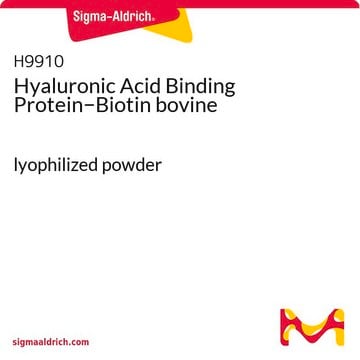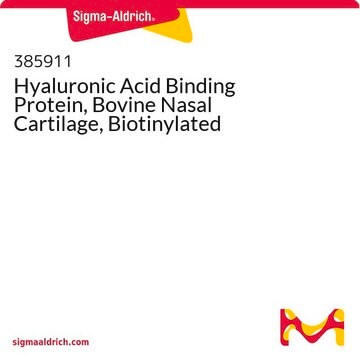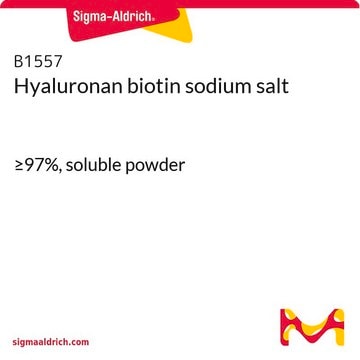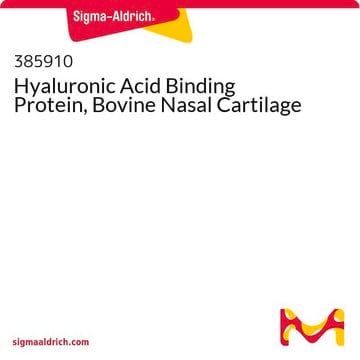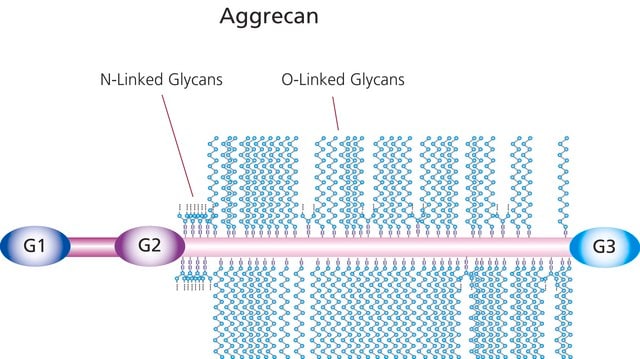H0161
Hyaluronic Acid Binding Protein bovine
lyophilized powder
Anmeldenzur Ansicht organisationsspezifischer und vertraglich vereinbarter Preise
Alle Fotos(1)
About This Item
Empfohlene Produkte
Biologische Quelle
bovine
Qualitätsniveau
Form
lyophilized powder
Methode(n)
immunofluorescence: suitable
UniProt-Hinterlegungsnummer
Lagertemp.
−20°C
Angaben zum Gen
cow ... VCAN(282662)
Allgemeine Beschreibung
Hyaluronic acid (HA) is a linear polysaccharide consisting of a repeating disaccharide of N-acetyl D-glucosamine (GlcNAc) and D-glucuronic acid (GlcA) with 1→4 interglycosidic linkages and these disaccharide repeating units are in turn linked by β (1→3) linkages. The number of repeating disaccharides in a HA molecule ranges from 2,000 to 25,000, which relates to a molecular mass of 106-107. The unique biological roles of HA is mainly due to the specific binding and interaction with HA-binding proteins also known as hyaladherins. Most hyaladherins is composed of a specific binding domain, also called a link module, which is composed of two α-helices and two antiparallel β-sheets.
Karl Meyer and John Palmer first isolated hyaluronic acid (HA) from the vitreous of bovine eyes. They coined the name “hyaluronic acid” as a conjugation of two words, hyaloid (vitreous) and uronic acid. HA has an extended random coil structure in physiological solution. Due to its random-coil structure and high molecular weight (HMW), HA forms very viscose and elastic solution with a huge hydrodynamic volume.
Anwendung
Hyaluronic Acid Binding Protein bovine may be used for incubation of specimens for immunofluorescence analysis of human megakaryocytes.
Biochem./physiol. Wirkung
Hyaluronic Acid Binding Protein (HABP) levels increases during oocyte maturation and it promotes cumulus expansion during in vitro maturation.
In addition to being an important structural component of tissues in all vertebrates, HA is also associated with several biological functions including intracellular signaling.
May be useful in hyaluronic acid binding or detection.
Lagerklassenschlüssel
11 - Combustible Solids
WGK
WGK 3
Flammpunkt (°F)
Not applicable
Flammpunkt (°C)
Not applicable
Persönliche Schutzausrüstung
Eyeshields, Gloves, type N95 (US)
Analysenzertifikate (COA)
Suchen Sie nach Analysenzertifikate (COA), indem Sie die Lot-/Chargennummer des Produkts eingeben. Lot- und Chargennummern sind auf dem Produktetikett hinter den Wörtern ‘Lot’ oder ‘Batch’ (Lot oder Charge) zu finden.
Besitzen Sie dieses Produkt bereits?
In der Dokumentenbibliothek finden Sie die Dokumentation zu den Produkten, die Sie kürzlich erworben haben.
Kunden haben sich ebenfalls angesehen
A G Haus
Radiologic clinics of North America, 25(5), 913-928 (1987-09-01)
Today there are many dedicated mammographic x-ray units available that are capable of providing high-quality screen-film mammograms. Likewise, screen-film combinations designed for mammography are capable of providing images with appropriate contrast, resolution, and noise levels. Proper film processing is most
Hyaluronan based hydrogels provide an improved model to study megakaryocyte-matrix interactions
Currao M, et al.
Experimental Cell Research, 346(1), 1-8 (2016)
Identification of hyaluronic acid-binding proteins and their expressions in porcine cumulus-oocyte complexes during in vitro maturation
Yokoo M, et al.
Biology of Reproduction, 67(4), 1165-1171 (2002)
G Perides et al.
The Journal of biological chemistry, 264(10), 5981-5987 (1989-04-05)
A glial hyaluronate-binding protein (GHAP) with an isoelectric point of 4.3-4.4 was isolated from human brain white matter. The 60-kDa glycoprotein appeared to be quite resistant to proteolysis, and comparison with GHAP from a viable glioma removed at surgery showed
Tal M Dankovich et al.
Nature communications, 12(1), 7129-7129 (2021-12-10)
The brain extracellular matrix (ECM) consists of extremely long-lived proteins that assemble around neurons and synapses, to stabilize them. The ECM is thought to change only rarely, in relation to neuronal plasticity, through ECM proteolysis and renewed protein synthesis. We
Unser Team von Wissenschaftlern verfügt über Erfahrung in allen Forschungsbereichen einschließlich Life Science, Materialwissenschaften, chemischer Synthese, Chromatographie, Analytik und vielen mehr..
Setzen Sie sich mit dem technischen Dienst in Verbindung.